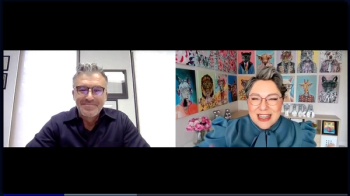
5 reasons I went back to school as an OD
It took many years before I finally stopped having academic anxiety dreams after optometry school.
You know the one I’m talking about. You wake up the morning of the final exam, not having attended a single lecture the whole semester, and you realize you’re unprepared and late for the final.
You rush to the building and get in the elevator, only to find out it goes sideways instead of up and down. You run up the stairs while bad guys dressed in black chase you with guns. They fire shots and yell at you in a language you don’t understand.
Finally, you arrive at the classroom. Everyone looks up from the test (which they are all acing) and starts hee-hawing. You look down, and you discover you’re either still in your pajamas, wearing a jockstrap and garter belt like baseball pitcher Ebby Calvin “Nuke” LaLoosh in the movie Bull Durham, or more likely, buck naked.
So with such nightmares behind me, why would I risk a good night’s sleep to go back to graduate school to get a master’s degree in my early 50s? What am I, crazy?
I got those questions a lot, so I decided to write down a few answers.
Professional healthcare education programs have long offered a doctorate combined with a Master of Business Administration (MBA), Master of Health Administration (MHA), or Master of Public Health (MPH). But increasingly, mid- and late-career practitioners are seeking additional degrees, too.
Here are five reasons I did:
1. Preparation for an “encore career”
While my clinical career has been satisfying, it’s possible that I might retire from my current position in a few years and want to start another gig.
I felt that broadening my knowledge base in other aspects of healthcare (such as administration, policy, law, leadership) and picking up new skill sets (like finance, informatics, quality improvement, human capital management) might open up new opportunities.
The Master of Health Sciences in Clinical Leadership (MHS-CL) at Duke University School of Medicine is an interdisciplinary, combined onsite/online program. It proved to be a good fit for me.
Even if I never “use it,” per se, I enjoyed the journey and added knowledge and skills that help me be more effective right now.
2. Professional renewal
A multi-decade optometry career can be a slog at times. Sometimes you just have to do something different and “shake things up.” It’s a paradox, but pursuing a challenging project like a master’s degree can renew, refresh, and sustain one through periods of burnout and boredom.
I found that as I continued the daily grind of patient care, my improved analytical ability, problem-solving skills, and time-management strategies helped me be more efficient while putting an extra spring in my step.
For those in private practice, an MBA or MHA can improve business and management skills that might put some extra cash in the wallet.
3. Getting outside the professional silo
It is all too easy for us busy optometrists to become isolated and preoccupied with daily concerns and needs that we fail to appreciate “the bigger picture” of the healthcare scene.
By traveling to a different part of the country and interacting with practitioners from other healthcare disciplines, I had the chance to represent my region, organization, and profession, as well as improve knowledge among faculty and students about who optometrists are and what we do.
It was a two-way street, though. Our dialogue gave me a better appreciation of the roles of other members of the broader healthcare community and the chance to “walk a mile in their shoes.”
4. Improved communication skills
While I already considered myself a decent writer, graduate school forced me to raise my game.
Writing assignments of all lengths and types were a large part of the curriculum. My writing became more lean, precise, and on point. Too many people prattle on when they write; at Duke, prattling on was frowned upon.
There were oral presentations galore, too, some live and some online, but the thesis defense was the mother of them all. The year-long process of researching, writing, revising, and ultimately defending my project before a committee of five very smart people was one of the greatest academic challenges I’ve ever faced.
Conquering it was a confidence booster that made me realize, hey, I can still do this.
5. It’s personal
During those three years, people asked me “Why are you doing this?” over and over again.
Finally, I started answering with a simple “Because I wanted to.”
Duke was my first choice as an undergraduate school. When I was accepted there, my parents were proud of me. But they sweated over how we could afford for me to go.
Then my dad died late in my senior year of high school, and the sudden change in family finances forced me to consider less costly options.
All that turned out fine, but I always felt I had unfinished business in Durham, North Carolina. When the opportunity appeared for me to go there and close that open loop later in life, I grabbed it.
My parents had left me a modest inheritance, and instead of using it to purchase a mid-life crisis Mercedes, I invested in a master’s from my “dream school.”
I’d like to think they’d still be proud of me.
Paying cash was key. The return on investment (ROI) in most cases is too iffy to justify incurring more debt.
Also, you don’t have to go back to graduate school to keep the old gray matter limber and crackling with electricity. Opportunities to take classes of all kinds abound in most places.
The main thing is to stay in the game, keep learning, and never stop growing. “Use it or lose it,” as the saying goes.
Chances are another crack at formal education later in life will not leave you feeling naked and afraid this time around.
You’ll have no nightmares, and maybe even get some sweet dreams fulfilled.
Newsletter
Want more insights like this? Subscribe to Optometry Times and get clinical pearls and practice tips delivered straight to your inbox.






























